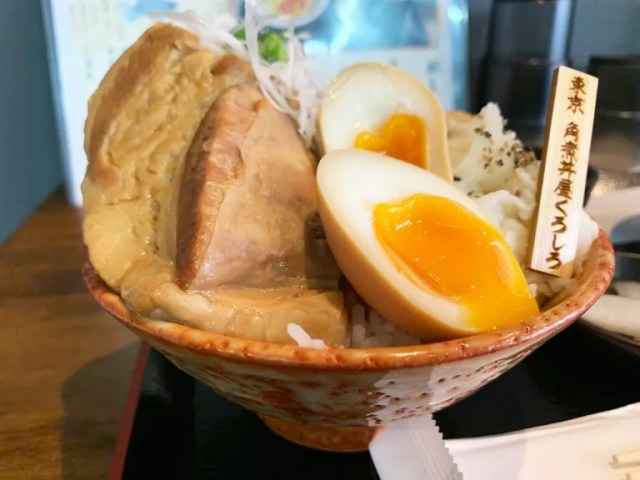
Located in a quiet part of a student neighborhood, this is where our kakuni dreams came true.
Kankuni is one of Japan’s most decadent foods. Thick cuts of braised pork belly simmered in a broth that includes soy sauce, mirin (cooking sake), and dashi (bonito stock), good kakuni is moist, meaty, tender, and tremendously filling.
All of those mouthwatering qualities were recently running through the head of our Japanese-language reporter Seiji Nakazawa. But perhaps because it’s so decadent, you’ll often find kakuni as a side dish, not the centerpiece of a meal. Seiji, though, wanted his kakuni to take center stage, and so he went on popular restaurant website Tabelog to look for a restaurant that specializes in kakuni rice bowls, which is when he found out that in all of Tokyo’s, there’s only one kakuni bowl specialist.
Luckily for Seiji, the city’s one-and-only kakuni bowl specialty restaurant is located in the Takadanobaba neighborhood, not far from SoraNews24 headquarters. So when lunchtime rolled around, Seiji hopped on the train for Takadanobaba Station. “Baba,” as the locals sometimes call it, is a student town, with the prestigious Waseda University nearby as well as a number of specialized schools. However, the restaurant, called Kuroshiro, is about a 15-minute walk to the southwest from the station, away from the hustle and bustle of commuting or carousing college kids.
Kuroshiro has a very low-key exterior, with an unmarked sun-faded awning and equally unassuming aluminum storefront sliding doors. Thankfully, a sidewalk signboard with the restaurant’s name (くろしろ) and a flag announcing kakuni bowls (角煮丼) told Seiji he’d arrived at the right place.
▼ Though the flag’s text was backwards from the angle he’d approached from.
In Japan, the basic foodie rule of thumb is that the more focused a restaurant’s menu is, the better job they do preparing those dishes. So Seiji was reassured when he saw that there are only two main dishes listed on Kuroshiro’s menu: the Kakuni Bowl Set Meal (角煮丼定食) and the Premium Kakuni Bowl Set Meal (特上角煮丼定食).
Something else drew his attention too, though: the price. The standard Kakuni Bowl Set Meal is 1,700 yen (US$11.30), and the Premium, which is essentially an extra-large portion of kakuni, is 2,800. Those aren’t cheap prices for a casual restaurant in a casual part of town. However, since this is Tokyo’s only kakuni specialist, Seiji felt like he should see it at its very best, so he ordered the Premium.
Still, at this price point Seiji was hoping that Kuroshiro would provide him with both quantity and quality. Thankfully, it didn’t take long for them to deliver on the first part of that promise.
As soon as the server placed Seiji’s meal in front of him, he was filled with startled excitement at the amount of meat. This is some jumbo-sized kakuni, not just in terms of surface area, but in thickness of the cuts too.
▼ It even comes with a little wooden sign that announces its presence with “Tokyo Kakuni Bowl Restaurant Kuroshiro.”
Between the shape and the size of the pieces of pork, Seiji felt like he had a kakuni mountain range in his bowl.
Of course, this feast for the eyes would quickly become a dagger in his heart if the beautiful-looking meat turned out to be of poor quality. Though Seiji loves kakuni, he’ll be the first to tell you that not every restaurant does a good job with it, and if you’re unlucky you can end up with tough, stringy pork.
Seiji intended to test the tenderness of Kuroshiro’s kakuni, which he intended to do by taking a tentative bite…but he actually didn’t even need to go that far because as soon as he touched the pork with his chopsticks…
…it jiggled, revealing its tantalizingly tender texture!
Now knowing that the kakuni both looked good and felt good, Seiji was happy, but not surprised, when he did take a bite and confirmed that it tasted great too. In fact, it was so good that it brightened up not only his day, but his outlook on life. Seiji’s been a little down in the dumps lately, feeling like he’s in a bit of a rut. Going out and finding exactly what he’d been searching for, though, and having it exceed all of his expectations, served as a reminder that there are still great things out there waiting for you to find them.
OK, so Kushiro is definitely worth visiting. There’s one thing to keep in mind, though. Remember how we mentioned the non-descript building exterior? That’s because Kushiro is only open from 11:30 a.m. to 2 p.m., with a different restaurant operating in the same space at night, so you’ll need to get your kakuni fix at lunchtime. The good news is that Kuroshiro is planning to open a second branch, one closer to Takadanobaba Station, next month, but for now this one is still Tokyo’s only kakuni bowl specialist.
Restaurant information
Kuroshiro / くろしろ
Address: Tokyo-to, Shinjuku-ku, Takadanobaba 3-37-2
東京都新宿区高田馬場3-37-2
Open 11 :30 a.m.-2 p.m. (last order 1:30 p,m,)
Closed Mondays, Wednesdays
Photos ©SoraNews24
● Want to hear about SoraNews24’s latest articles as soon as they’re published? Follow us on Facebook and Twitter!
[ Read in Japanese ]



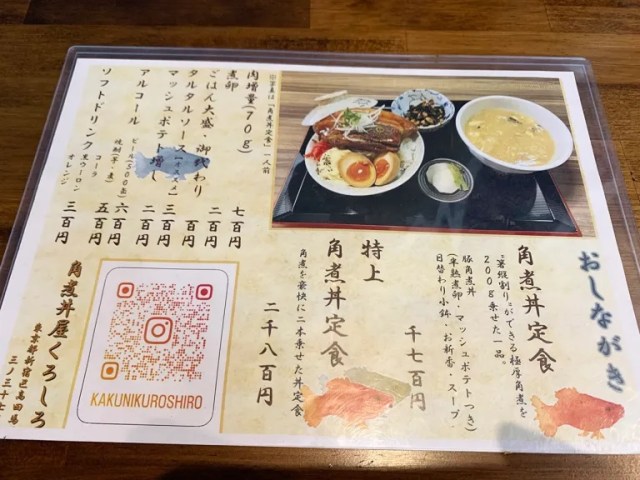
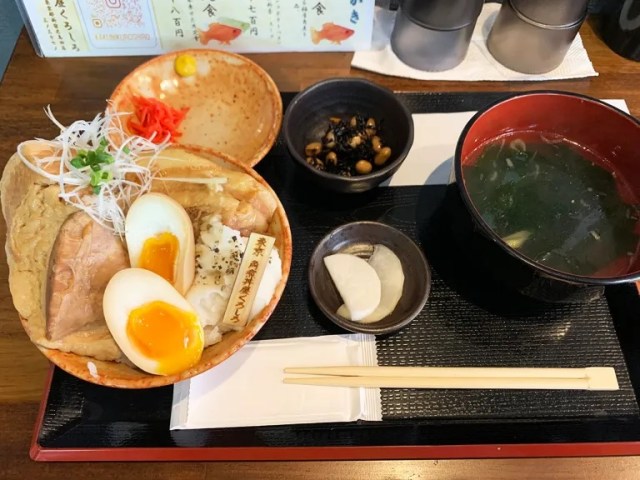
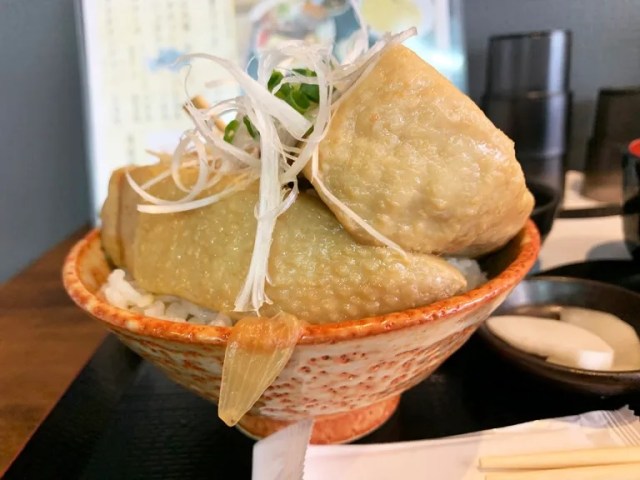
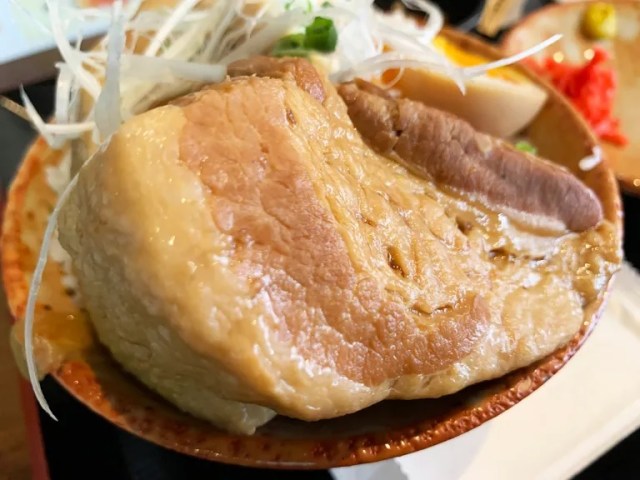
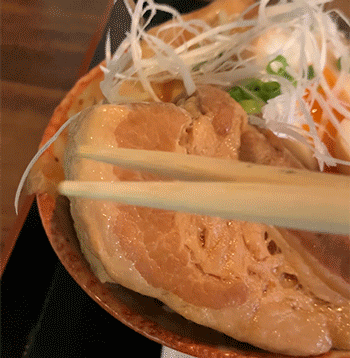
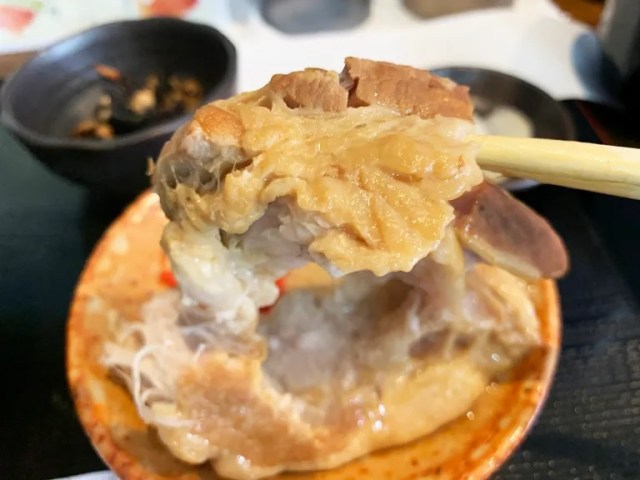
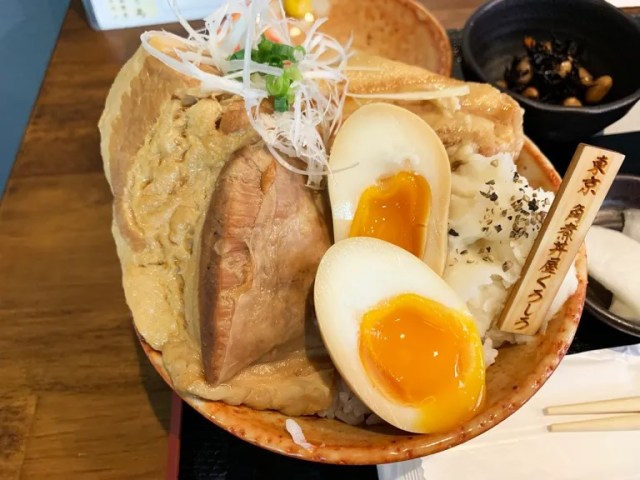
 Does thin-strip beef specialist Yoshinoya know what it’s doing with thick-cut pork?【Taste test】
Does thin-strip beef specialist Yoshinoya know what it’s doing with thick-cut pork?【Taste test】 Which convenience store has the best kakuni Japanese braised pork? We find out【Taste test】
Which convenience store has the best kakuni Japanese braised pork? We find out【Taste test】 In our search for crispy katsudon, we try a highly recommended place in a Tokyo university town
In our search for crispy katsudon, we try a highly recommended place in a Tokyo university town Non-ramen Ramen Restaurant Stars: The quest begins at Tokyo’s Oreryu Shio
Non-ramen Ramen Restaurant Stars: The quest begins at Tokyo’s Oreryu Shio This is Japan’s oldest oyakodon chicken-and-egg rice bowl restaurant, and it’s awesome
This is Japan’s oldest oyakodon chicken-and-egg rice bowl restaurant, and it’s awesome Highest Starbucks in Japan set to open this spring in the Tokyo sky
Highest Starbucks in Japan set to open this spring in the Tokyo sky Saitama is home to the best strawberries in Japan that you’ve probably never even heard of
Saitama is home to the best strawberries in Japan that you’ve probably never even heard of Development of Puyo Puyo puzzle game for use in nursing homes underway
Development of Puyo Puyo puzzle game for use in nursing homes underway Family Mart’s Shibuya Cat Street shop hosts first-ever rescue cat photo exhibition for Cat Day
Family Mart’s Shibuya Cat Street shop hosts first-ever rescue cat photo exhibition for Cat Day Beautiful blue apple jam is taking the Japanese internet’s breath away!
Beautiful blue apple jam is taking the Japanese internet’s breath away! Foreign tourists in Japan will get free Shinkansen tickets to promote regional tourism
Foreign tourists in Japan will get free Shinkansen tickets to promote regional tourism 16 years’ worth of One Piece manga now free-to-read online to celebrate series 1,000th chapter
16 years’ worth of One Piece manga now free-to-read online to celebrate series 1,000th chapter Hello Kitty Shinkansen Cafe: A delicious stop on the most kawaii bullet train in Japan
Hello Kitty Shinkansen Cafe: A delicious stop on the most kawaii bullet train in Japan Here comes Japan’s newest fruit dessert sandwich: 7-Eleven’s purple Blueberry Sandwich!
Here comes Japan’s newest fruit dessert sandwich: 7-Eleven’s purple Blueberry Sandwich! Act of Japanese kindness touches one man’s heart, provides hope for elevator etiquette
Act of Japanese kindness touches one man’s heart, provides hope for elevator etiquette The 10 most annoying things foreign tourists do on Japanese trains, according to locals
The 10 most annoying things foreign tourists do on Japanese trains, according to locals Starbucks Japan releases new sakura goods and drinkware for cherry blossom season 2026
Starbucks Japan releases new sakura goods and drinkware for cherry blossom season 2026 Naruto and Converse team up for new line of shinobi sneakers[Photos]
Naruto and Converse team up for new line of shinobi sneakers[Photos] Is Sapporio’s Snow Festival awesome enough to be worth visiting even if you hate the snow? [Pics]
Is Sapporio’s Snow Festival awesome enough to be worth visiting even if you hate the snow? [Pics] Japan has trams that say “sorry” while they ride around town…but why?
Japan has trams that say “sorry” while they ride around town…but why? Tokyo Skytree turns pink for the cherry blossom season
Tokyo Skytree turns pink for the cherry blossom season Sakura Totoro is here to get spring started early with adorable pouches and plushies
Sakura Totoro is here to get spring started early with adorable pouches and plushies Poop is in full bloom at the Unko Museums for cherry blossom season
Poop is in full bloom at the Unko Museums for cherry blossom season Shibuya Station’s Hachiko Gate and Yamanote Line stairway locations change next month
Shibuya Station’s Hachiko Gate and Yamanote Line stairway locations change next month Japan’s new “Cunte” contact lenses aren’t pronounced like you’re probably thinking they are
Japan’s new “Cunte” contact lenses aren’t pronounced like you’re probably thinking they are Japan’s newest Shinkansen has no seats…or passengers [Video]
Japan’s newest Shinkansen has no seats…or passengers [Video] Foreigners accounting for over 80 percent of off-course skiers needing rescue in Japan’s Hokkaido
Foreigners accounting for over 80 percent of off-course skiers needing rescue in Japan’s Hokkaido Super-salty pizza sends six kids to the hospital in Japan, linguistics blamed
Super-salty pizza sends six kids to the hospital in Japan, linguistics blamed Starbucks Japan unveils new sakura Frappuccino for cherry blossom season 2026
Starbucks Japan unveils new sakura Frappuccino for cherry blossom season 2026 Take a trip to Japan’s Dododo Land, the most irritating place on Earth
Take a trip to Japan’s Dododo Land, the most irritating place on Earth Is China’s don’t-go-to-Japan warning affecting the lines at a popular Tokyo gyukatsu restaurant?
Is China’s don’t-go-to-Japan warning affecting the lines at a popular Tokyo gyukatsu restaurant? Survey asks foreign tourists what bothered them in Japan, more than half gave same answer
Survey asks foreign tourists what bothered them in Japan, more than half gave same answer Japan’s human washing machines will go on sale to general public, demos to be held in Tokyo
Japan’s human washing machines will go on sale to general public, demos to be held in Tokyo Starbucks Japan releases new drinkware and goods for Valentine’s Day
Starbucks Japan releases new drinkware and goods for Valentine’s Day We deeply regret going into this tunnel on our walk in the mountains of Japan
We deeply regret going into this tunnel on our walk in the mountains of Japan Studio Ghibli releases Kodama forest spirits from Princess Mononoke to light up your home
Studio Ghibli releases Kodama forest spirits from Princess Mononoke to light up your home Major Japanese hotel chain says reservations via overseas booking sites may not be valid
Major Japanese hotel chain says reservations via overseas booking sites may not be valid Put sesame oil in your coffee? Japanese maker says it’s the best way to start your day【Taste test】
Put sesame oil in your coffee? Japanese maker says it’s the best way to start your day【Taste test】 No more using real katana for tourism activities, Japan’s National Police Agency says
No more using real katana for tourism activities, Japan’s National Police Agency says Crazy Tokyo restaurant offers a 7.3-pound tempura rice bowl, so of course we had to eat it!
Crazy Tokyo restaurant offers a 7.3-pound tempura rice bowl, so of course we had to eat it! Mr. Sato attacks a massive castle of seafood at a new restaurant in Tokyo Skytree’s Solamachi
Mr. Sato attacks a massive castle of seafood at a new restaurant in Tokyo Skytree’s Solamachi Japan’s favorite pork cutlet sandwich maker also has awesome katsudon restaurant in Tokyo Station
Japan’s favorite pork cutlet sandwich maker also has awesome katsudon restaurant in Tokyo Station Shibuya strip show-adjacent extra-fatty beef bowl fails and succeeds in impressing us
Shibuya strip show-adjacent extra-fatty beef bowl fails and succeeds in impressing us We eat the best crayfish of our life at a Tokyo specialty restaurant【Taste test】
We eat the best crayfish of our life at a Tokyo specialty restaurant【Taste test】 Yoshinoya has a semi-secret chicken bowl you won’t find anywhere on its website【Taste test】
Yoshinoya has a semi-secret chicken bowl you won’t find anywhere on its website【Taste test】 Super-spicy Tokyo ramen served in a 572-degree Fahrenheit bowl? Yep, we’ll eat that!【Taste test】
Super-spicy Tokyo ramen served in a 572-degree Fahrenheit bowl? Yep, we’ll eat that!【Taste test】 How to make a secret rice bowl at Ichiran ramen
How to make a secret rice bowl at Ichiran ramen Demon Slayer teams up with beef bowl chain to excite fans, test their dexterity with Tanjiro bowl
Demon Slayer teams up with beef bowl chain to excite fans, test their dexterity with Tanjiro bowl Brand-new salmon sashimi bowl joint in Tokyo’s Harajuku is perfect for hungry fashion fans, bears
Brand-new salmon sashimi bowl joint in Tokyo’s Harajuku is perfect for hungry fashion fans, bears Bear meat noodles?!? Tokyo restaurant adds a new kind of niku soba to its menu【Taste test】
Bear meat noodles?!? Tokyo restaurant adds a new kind of niku soba to its menu【Taste test】 Restaurant Yoshibei is crazy in the best way: A pork cutlet set with a side of pork cutlet bowl
Restaurant Yoshibei is crazy in the best way: A pork cutlet set with a side of pork cutlet bowl Tokyo restaurant staying one step ahead of big eaters with its continually growing tempura bowl
Tokyo restaurant staying one step ahead of big eaters with its continually growing tempura bowl Awesome mountain of meaty goodness now at beef bowl restaurant in Tokyo’s Akihabara and Shimbashi
Awesome mountain of meaty goodness now at beef bowl restaurant in Tokyo’s Akihabara and Shimbashi KFC sells rice bowls in Japan, but are they finger-lickin’ good? 【Taste Test】
KFC sells rice bowls in Japan, but are they finger-lickin’ good? 【Taste Test】